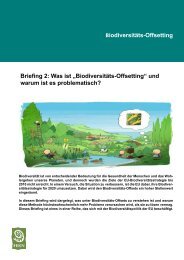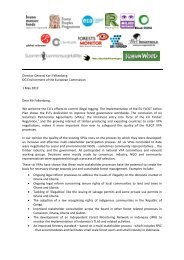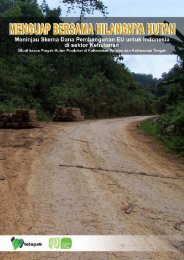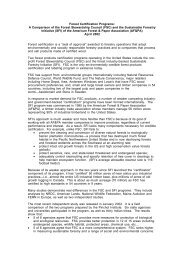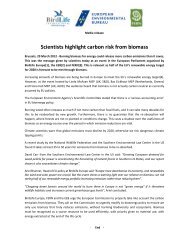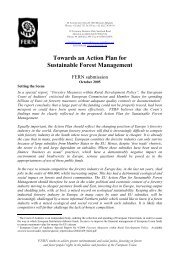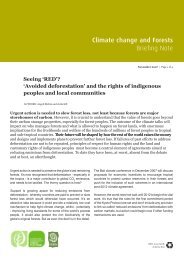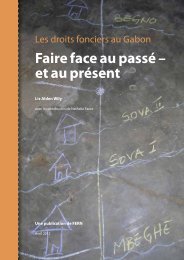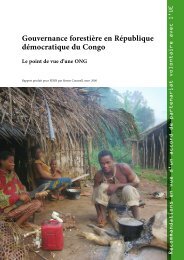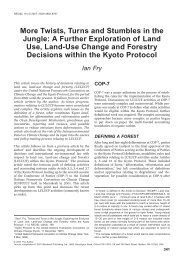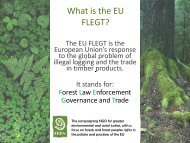Papua New Guinea - Fern
Papua New Guinea - Fern
Papua New Guinea - Fern
Create successful ePaper yourself
Turn your PDF publications into a flip-book with our unique Google optimized e-Paper software.
Logging Boom Threatens Biodiversity and Ecosystems<br />
There has been a complete breakdown in forest sector management in <strong>Papua</strong> <strong>New</strong> <strong>Guinea</strong>. One<br />
of the World’s last great rainforests – an ancient store of evolutionary brilliance displayed<br />
through its biodiversity – is being razed to the ground. For one and a half decades, reform of this<br />
industry has failed miserably. <strong>Papua</strong> <strong>New</strong> <strong>Guinea</strong>ns receive only a pittance for these log exports<br />
– while bearing significant immediate environmental costs and forgone development options. In<br />
essence, <strong>Papua</strong> <strong>New</strong> <strong>Guinea</strong>ns are paying for their forests to be logged.<br />
In the late 1980s, the Barnett Inquiry, which exhaustively investigated the PNG timber industry,<br />
reported "It would be fair to say, of some of the companies, that they are now roaming the<br />
countryside with the self-assurance of robber barons; bribing politicians and leaders, creating<br />
social disharmony and ignoring laws in order to gain access to, rip out, and export the last<br />
remnants of the province's valuable timber." The Prime Minister of PNG recently admitted<br />
"Governance has been particularly poor in the area of forestry, with the side effect of promoting<br />
corrupt practices and undermining environmental sustainability in logging activities". Recent<br />
reports indicate the following problems continue to systematically plague the industry:<br />
• Still virtually no sustainable forestry projects<br />
• Widespread environmental damage<br />
• Logging projects provide few long-term benefits, causing social upheaval<br />
• Corruption a persistent problem at all levels of the industry<br />
• Minimal domestic processing investment<br />
• Alternatives to industrial log exports such as eco-forestry projects are not supported<br />
• Continued violations of human rights<br />
After countless broken promises to pursue reform by the government, and millions of dollars of<br />
failed donor aid programs, including massive subsidies to reform commercial logging, nothing<br />
has changed – in fact, it has gotten worse. The emphasis for biodiversity conservation continues<br />
to be upon reforming the poorly performing logging industry – trying to establish monitoring and<br />
policing that would end the worst of the abuses. But after 15 years of efforts this has still not<br />
been successful. There has been no questioning of the dominant paradigm that commercial scale<br />
forestry in these tropical rainforests may be inimical to biodiversity conservation, and will never<br />
achieve acceptable levels of ecological sustainability, biodiversity conservation and community<br />
development. Local initiatives by forest peoples to protect and benignly manage their forests are<br />
actively impeded.<br />
<strong>Papua</strong> <strong>New</strong> <strong>Guinea</strong>'s magnificent ancient forests and biodiversity are at a crossroads. They can<br />
continue to be ravaged by industrial logging, or they can flourish and be sustained, providing<br />
long-term livelihoods for communities that manage them while maintaining biodiversity and<br />
operable ecosystems. Given well-documented concerns regarding the environmental and social<br />
costs of the current timber industry, it is difficult to justify continued exploitive and nonsustainable<br />
log exports. PNG has a real opportunity to change the way that forest are managed to<br />
ensure greater benefits for PNG, conserve biodiversity and achieve long term sustainability. But<br />
first it needs a well-conceived National Biodiversity Strategy and Action Plan that addresses,<br />
head on, the threat posed by commercial logging – while detailing a new forest management<br />
paradigm based upon community eco-forestry management and protected areas.<br />
11



